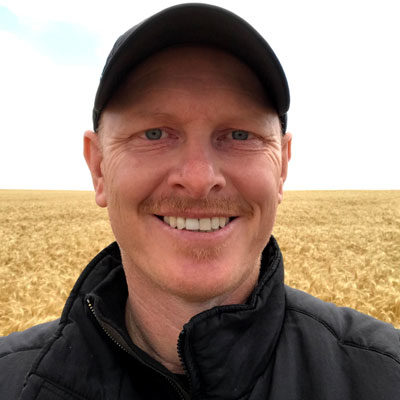
Nigel Myers
Regional Winner | Sustainability category
Lower Eyre Peninsula, SA
Nigel Myers is an adviser at NAS Cummins and a 2020 Growth Awards Regional Winner in the Sustainability category. Read on to learn more about Nigel.
What’s the one thing you have done in your career you are most proud of?
It’s hard to answer because there are things that I am proud of that my peers would know about and things that I am personally proud of.
In terms of the industry, I have campaigned for new products for the control of diamondback moth in canola. After having quite an issue with insecticide resistance in diamondback moth and no control measures, I lobbied industry bodies and the GRDC to try to source new ingredients that would provide the level of control that we needed in canola. Through that pressure, we were able to get some new products into the market. It’s important to have those new products coming on, as this particular pest builds up resistance quite quickly. But I am equally proud of things I have done which no one would see or know about. I have worked with growers who were going through tough times, some sat next to me in their utes with tears in their eyes talking about what a failure they are. It gives me great satisfaction that I have supported these people and worked through a management strategy, and to date, I’ve been able to get their businesses back on track. It gives you a lot of personal satisfaction to be able to be able help my clients through good and bad times.
How will you share what you learn with others in the industry?
The first place I share any knowledge I have gained is with my colleagues, the six other agronomists in our branch. If any of us go on a study tour, we come back and have a discussion on what we have seen and what is worth following up. Each of those agronomists then goes on and shares that information with their clients. We also have client meetings, newsletters and other industry meetings where information can be shared. I’m not big on sending long emails because the feedback we get is that people don’t read them. We feel it is more effective to communicate through WhatsApp groups, or even Twitter, with a photo and a short piece of information which can get a clear message through. Word of mouth is also very important and when people know you have been part of a study tour, they are sure to come to you with questions.
What do you see as your biggest opportunity in the next 12 months?
The great opportunity for our growers in the next year is the likelihood that we will be able to grow GM canola. This is a new tool for growers. We have major ryegrass resistance issues in our area, and I will use my skills to educate growers to feel confident in this new technology. Ryegrass is one of their major weeds and this is where the majority of their herbicide budget is directed. Roundup Ready technology will enable them drive down their ryegrass population and seed numbers. We do a lot of ryegrass resistance testing in the business so we have shown growers what they could achieve if they did have the technology. We find that quite exciting to be able to bring that to the market. (Interview conducted prior to local council approval for the growing of GM crops).
What is the biggest challenge Australian Ag has to overcome in the next 10 years?
The barrier for the next 12 months is the same barrier I see every year and that is uncertainty, whether it’s planning for weather events that may or may not occur, market volatility, what diseases will occur during the season or what insects will attack. COVID-19 could still impact us next year and potentially interrupt our supply. If there is an outbreak of COVID-19 at harvest time, it could affect the grain receival ports. If they had to close, how would growers handle that? All those uncertainties are our challenges and potential barriers to success – so it’s about trying to set up strategies to cope with what you don’t know will occur.
I see the major challenge as farmer profitability. ABARES reported that over the past 20 years, farm profitability has dropped by more than 20 per cent. Our farmers are known for being some of the most efficient in the world, they are not subsidised, and we need to make sure that they remain profitable.
We want to make sure that family farms are profitable and remain. Farming will always be there, but it could be that they are taken up by corporate entities. In the regional areas, we are starting to find there are less volunteers and sporting clubs are struggling for numbers because those families that were there are disappearing because the farms are not profitable. They are selling up and either the neighbour buys them or in some situations, it is the corporates coming in.
We need to look at the survival of those farming communities. We need to keep adapting and look at where we can make farm businesses more sustainable. It’s the farmers, the advisers and the researchers who all need to come at it to make sure that we are achieving the best profits for the dollars spent.